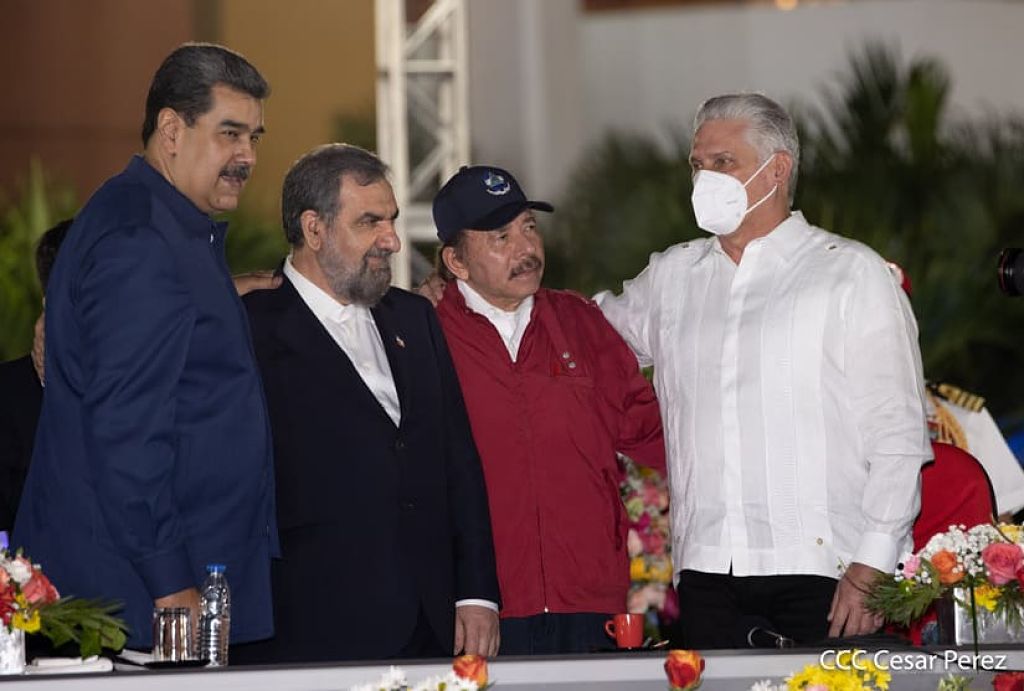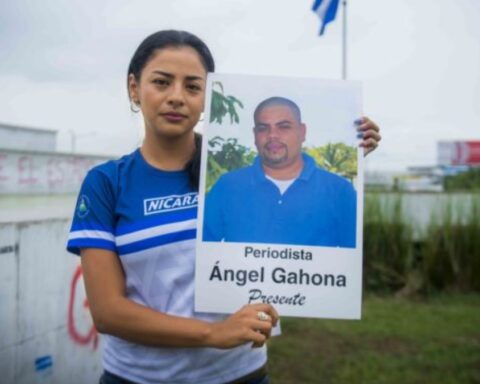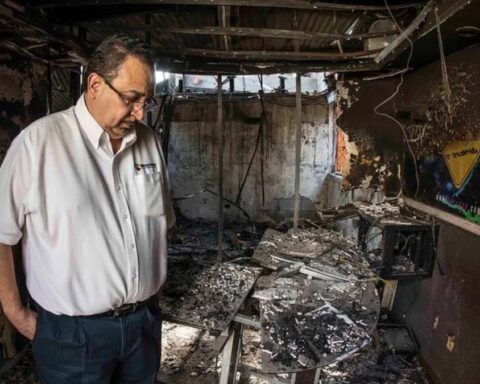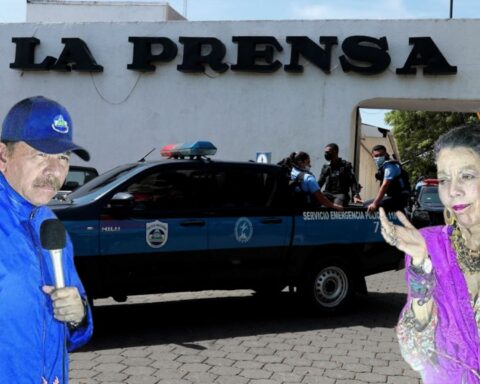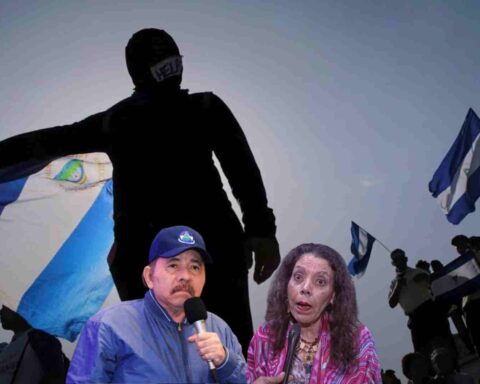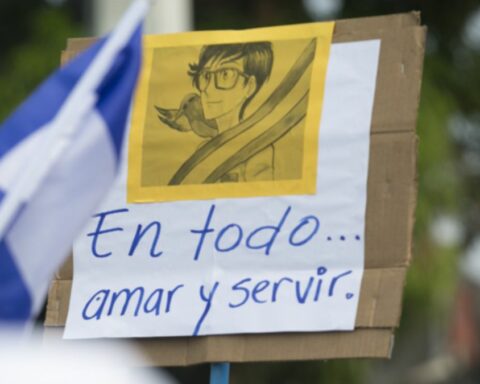Daniel Ortega’s latest diplomatic scandal seems like a chapter from a novel. An Iranian accused of terrorism in Argentina, Mohsen Rezai, is invited to the investiture of the Nicaraguan dictator and shares the act with the ambassador of the aggrieved country, Mateo Daniel Capitanich, who does not withdraw from the event, nor does he denounce, much less ask for the immediate capture of the person in question, even though Interpol has been looking for him since years ago.
The Argentine Daniel Santoro, one of the most prominent investigative journalists in the region, says that “we are talking about an at least enormous clumsiness” that has caused pain and bitterness in certain sectors of Argentine society, because family members “see a lack of understanding for an issue that has to do with international terrorism.”
The Argentine justice attributes the intellectual authorship of the attack to former Iranian officials and the material authorship to a command of the Lebanese terrorist group Hezbollah. A car bomb with 300 kilos of ammonal explodes at the headquarters of the Asociación Mutual Israelita Argentina (AMIA). The seven-story building collapses, killing those inside and a child walking on the sidewalk of the complex. There were 84 deaths in that painful 1994.
“They were crushed to death,” he recalls. Santoro who also investigated the death in strange circumstances in January 2015 of Alberto Nisman, the prosecutor who denounced former president Cristina Fernández de Kirchner (current deputy president) for signing a memorandum of understanding with Iran that, two years earlier, had impunity Iranian defendants in the AMIA case. He was no longer able to make the complaint in Congress, however, he was found dead in his apartment one day before the scheduled appointment in the Legislative.
How can this affect the immediate relationship between Argentina and Nicaragua after the scandal unleashed by the Iranian’s presence at Ortega’s inauguration?
The scandal had a criminal complaint filed by the victims’ lawyer of the attack against the Jewish mutual society AMIA. Three opposition deputies joined her. There have also been a number of requests for reports and protests from opposition parties, because the Argentine government protested late and badly.
Also, for one thing that would be important: for the Argentine intelligence service to know in advance whether Rezai was going to be present or not. There have already been previous cases such as a visit by another of the Iranians accused of the attack in Bolivia, but there the reaction was quick and he withdrew immediately. I am talking about the time of Evo Morales during the second presidency of Cristina (Fernández de) Kirchner.
What surprised you the most? The position of the Argentine ambassador who shared the act with the high-ranking Iranian official or the explanations to which the Foreign Ministry of your country is forced a day later?
The Argentine ambassador to Nicaragua, Daniel Capitanich, should have known that a character of such importance as Rezai, in the Iranian government, was going to be present and would have automatically withdrawn. Having filed a protest with the Government of Nicaragua that should have activated the Police, which is a member of Interpol, to arrest him. And now you should complain, because an order that has been in place for years has not been executed.
This has a huge impact here, because the only tool that the Argentine justice system has to try to do justice in this case, which remains unpunished, are those red alerts to the extent that Argentina does not have the resources to stop, much less invade or attack Iran. as the United States has done with Afghanistan and Iraq, after the attack on the Twin Towers.
Here it is an issue that is always on the agenda, because there has even been a debate; a legal case against former president Cristina Kirchner, because during her last presidency she signed a controversial memorandum of understanding with Iran where she delegated the sovereignty of the Argentine justice system to Iran, they created a binational court to review what the Argentine justice system decided regarding the participation of these Iranians as intellectual authors and a case that was dismissed months ago, but has still been appealed to what is called the Criminal Cassation Chamber.
It is a truly worrying issue, which has broken with a tradition that began in 1983. Argentina, after having had this symbolic figure of 30,000 disappeared —what does it matter if they are more or less, the seriousness of the tragedy of the dictatorship is enormous!—put human rights in a universal category—above the country’s right to non-interference in its internal affairs and other arguments used by the dictatorship.
In 1983, when democracy was restored in Argentina, all governments, including Néstor Kirchner, always put the issue of human rights violations first. HH., be it a government of the right or of the left, theocratic or whatever.
However, the Government of Alberto Fernández and Cristina Kirchner has gone back again on this matter and has had an attitude of tolerance in the face of human rights violations. H H. of the Ortega regime and Venezuela. For this reason, around here it has provoked controversy, disappointment, bitterness, in many sectors.
Why do you think this silence of the Government of (Alberto) Fernández occurs?
Because in 2013, when Cristina Kirchner signed this failed memorandum of understanding with Iran, she also broke with another State policy of all the presidents —since the attack occurred in 1994 onwards—, I am talking about President Carlos Menem, De la Rúa, of Duhalde, of Néstor Kirchner who defended the hypothesis of the Argentine Justice that Iran was the intellectual author.
Why did you do that? Because Hugo Chávez asked him to. I tell that in my book “Nisman must die”. Néstor Kirchner had a very good relationship with Hugo Chávez to the point that he gave him a loan to pay Argentina’s debt with the International Monetary Fund, but he never joined ALBA. He never made political agreements.
Cristina began to backtrack on that and became an accomplice in the violation of human rights in Venezuela. Even the government of Alberto Fernández when Michelle Bachelet, the former president of Chile from a socialist government arrives at the United Nations organizations, makes an impeccable report on this issue, not even the Argentine government appealed.
Therefore, Cristina has a lot of influence. There is talk that she has power despite the fact that she is not the president. It is the one that has decided, in order to maintain that alliance made with Chavez and his ALBA partners like Nicaragua and other regimes, to continue forward no matter what the cost.
How do you assess Ortega’s attitude?
If the Government of Nicaragua knew this in advance, it should have notified Capitanich as a matter of good relations so that at least he did not go. There really is a very dark point there. It is not known if the Nicaraguan Foreign Ministry alerted Capitanich that Rezai, this high-ranking Iranian official, accused by the AMIA, was going to be at that act of homage.
To give you an idea: when all the Argentine presidents go to the United Nations and the president of Iran, the prime minister or whatever is present, they leave the United Nations palace in New York, so here we are talking about clumsiness. Huge at least. Here’s a criminal complaint.
You know this because the Argentine government should have activated those red alerts (from Interpol), if it had a different attitude from the one it had in the face of a scandal like this one that really has international characteristics. To the point that the United States Department of State also complained about Rezai’s presence in Nicaragua.
What is the immediate reaction of the relatives once they saw the Iranian at the inauguration?
I know, above all, Louis Czyzewski, the former president of the association of relatives of those killed in the AMIA. He released a statement with a note of deep pain, because he has felt groped, outraged.
The disappointment is enormous and they see a misunderstanding for an issue that has to do with international terrorism, and where in Argentina —at least the opposition, relatives and others— would like to see that the Government of Nicaragua makes a distinction between what it can become political, that there can be differences of all kinds, and an act of international terrorism.
How does it impact the Government of Nicaragua to have first invited this character and then have a private meeting with him, despite the criticism?
There we have to see what the State Department and the European Union are going to do. The United States already has these Iranians and members of Hezbollah on a blacklist of countries and members of terrorism. They have taken a series of financial sanctions against allies of theirs abroad, not only for the attack in Argentina.
Iran is accused of murdering dissidents in Germany, of blowing up the car of another Iranian dissident in Greece, there are several cases on this subject. I believe that the statement (from the US) is going to be carefully studied to see if eventually they also sanction Nicaragua, but obviously it is a spring that I do not know about and the only thing I can say is what has happened in other cases.
For months you investigated the murder of prosecutor Nisman, which continues to go unpunished like the 1994 attacks. How can a society live with the lack of punishment for those responsible?
The impunity in the AMIA case is due to the internal political fights of the judiciary, politics, the intelligence services and even the Jewish community in Argentina. But the most serious thing was the signing of the memorandum of understanding with Iran by Cristina Kirchner.

